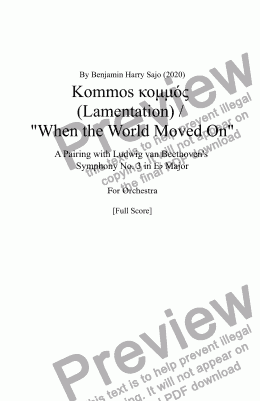Ready to print
You have already purchased this music, but not yet printed it.
This page is just a preview and does not allow printing. To print your purchase, go to the My purchases page in your account and click the relevant print icon.

Already purchased!
You have already purchased this score. To download and print the PDF file of this score, click the 'Print' button above the score. The purchases page in your account also shows your items available to print.
This score is free!
Buy this score and parts
Kommos κομμός (Lamentation) / "When the World Moved On"
$51.50
$20.00
$31.50
from $3.50
Preview individual parts:
Instant download
You are purchasing high quality sheet music PDF files suitable for printing or viewing on digital devices.Programme Notes: This composition was written to be considered for pairing alongside Ludwig van Beethoven’s Symphony #3, the “Eroica”, but can stand on its own virtues as an intense and slow meditation on heroism. The music is like a boiling pot on the stove that’s just begun to overflow its bubbles.
The first part of the title, kommos , is a Classical Greek term from Attic dramaturgy, literally meaning “striking” but specifically referring to beating oneself up during lamentation–ripping at the hair, gouging out the eyes–like Oedipus–slapping the forehead, and other acts amid moments of extreme emotional turmoil. For example, from Aeschylus's play Agamemnon , a character bewails: “Apollo, Apollo! God of the Ways, my destroyer! For you have destroyed me—and utterly […]What is this fresh woe […]what monstrous, monstrous horror, beyond love's enduring, beyond all remedy? And help stands far away!” We can easily imagine physical accompaniment to the script; rather than bottling up the pain, the hero lets it all explosively come out.
The second part of the title, “When the world moved on,” is an epigraph taken from American author Stephen King’s The Dark Tower epic. The primary setting of the novel, a world similar in many ways to our own, is experiencing a dark age where the glorious past is all but a distant memory and all good things are referred to wistfully as occurring, “When the world moved on.” Yet, the main protagonist, Roland, the last gunslinger, emphasizes that it is not just a figure of speech, but the literal distances between destinations have increased, the positions of the stars have changed, as well as the occurrence of other unnatural phenomena. The world has become a gulf of isolation from all corners.
Taken together, this piece is a lamentation for when the world moved on. Truly completed on Yom Kippur during the Covid-19 Pandemic, being unable to fast or go to synagogue, this is my atonement.
About the Composer: Benjamin Sajo (b. 1988) is a Canadian composer of contemporary classical music, as well as an educator. Since developing a fiercely independent creative voice upon the completion of his studies at Western (2010) and McGill Universities (2013), he continues to find inspiration from the intersection of mythology, art, and nature upon the contemporary human experience. In 2019, he released his premiere album of original music, The Great War Sextet: Canadian War Poetry with Trombone & Strings , with support from the Ontario Arts Council. He is a member of SOCAN and the League of Canadian Composers.



